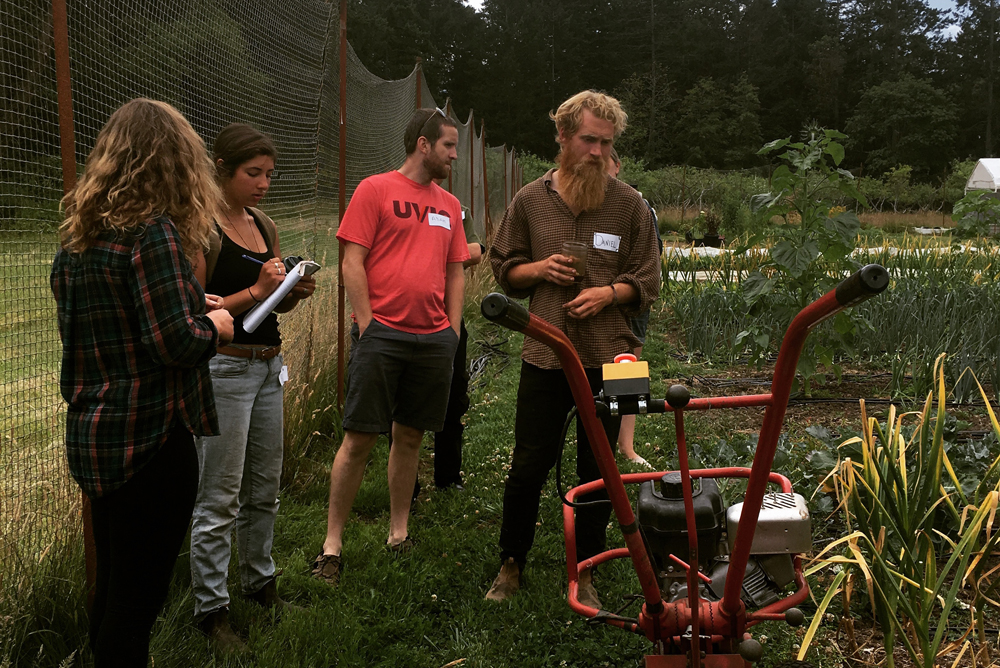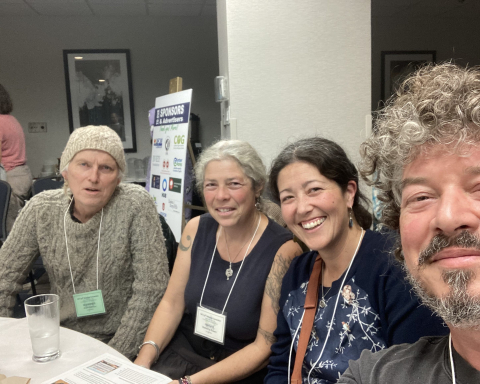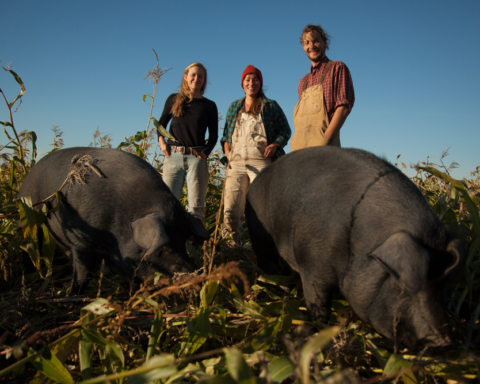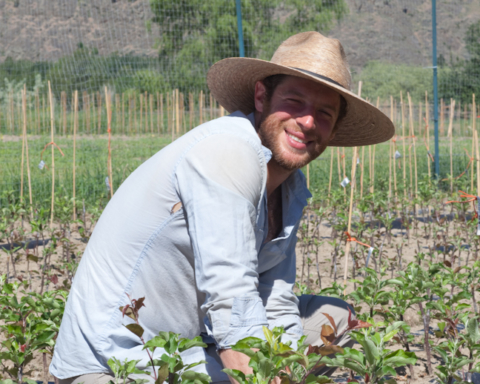Charles Z Levkoe and Michael Ekers
Originally published by Ecological Farmers Association of Ontario in “Ecological Farming in Ontario”. This is part 4 of a 4 part series on research into unpaid farm labour. While the research was conducted with farms in Ontario, much of the findings likely carry over to BC. In 2017, the authors published a workshop report on Ecological Farm Internships that is available for download here: www.foodandlabour.ca/results-and-reflections.
This article is the fourth in a series that describes the increasing trend of non-waged interns working on ecological farms across Ontario. In this article we explore some of the legal implications of these practices and the ensuing concerns from farmers and interns across the province. This article should not, under any circumstances, be considered legal advice and we recommend that the appropriate government departments or legal specialists be contacted regarding specific questions. Also, the laws surrounding farm internships in Ontario are extremely vague. We do not try to determine whether these internships are legal or not, as we are ill-equipped to do so as non-lawyers, but we do attempt to highlight the legal landscape as we understand it and the gaps and ambiguities that deserve further legal research
In previous articles, we established that ecological farm internships offer many things to trainees (e.g., knowledge and skill training), farmers (e.g., support for ecological food production) and the broader food movement. However, the legality of these labour arrangements in Ontario remains uncertain, especially after cases have been settled elsewhere in which unpaid interns were awarded back-wages. For example, in 2013, two farm interns in British Columbia claimed their work arrangement did not meet provincial employment standards and settled out of court for several months’ worth of back-wages. This case caused significant concern for farmers across the country using non-waged interns.
There have been increasing government crackdowns on (non-agricultural) internship programs throughout North America. According to the Ontario Ministry of Labour, between September and December 2015 employment standards officers found that of 77 workplaces that had interns, almost a quarter did not meet legal requirements under the Employment Standards Act (ESA). As a result, many Ontario farmers have been deeply concerned that their use of non-wage interns could be judged in contravention of the law. One farmer commented, “I worry sometimes because there are some farms who aren’t doing things properly with payroll and that’s the type of thing that could end with crackdowns that affect all of us”. A farmer and non-profit director explained, “Some farmers are surprised when I suggest that there’s a risk because they are technically breaking labour rules and relying on the good will of the intern and the internship going well to avoid litigation down the line”.
In Ontario, there are two main areas of legislation that impact farm internships. First, the ESA sets out the rights and responsibilities of both employees and employers and contains fairly clear guidelines to what makes an internship. In short, if you perform work that is of benefit to another person or business, you are considered an employee and therefore entitled to rights under the ESA such as minimum wage. One exception to these rules is for trainees; however, these cases have very restrictive conditions. According to the Ministry of Labour, if an intern receives training used by employees, they would also be considered an employee unless the following six conditions are met:
- The training is similar to that which is given in a vocational school.
- The training is for the benefit of the intern. You receive some benefit from the training, such as new knowledge or skills.
- The employer derives little, if any, benefit from the activity of the intern while he or she is being trained.
- Your training doesn’t take someone else’s job.
- Your employer isn’t promising you a job at the end of your training.
- You have been told that you will not be paid for your time.(www.labour.gov.on.ca/english/es/pubs/internships.php)
In addition, farmers taking on interns should be clear on whether they meet regulatory compliance guidelines in Ontario. Aside from the ESA, employers must be in compliance with the Workplace Safety and Insurance Act (WSIA) and the Occupational Health and Safety Act (OHSA). As operators will know, the Workplace Safety and Insurance Board (WSIB) administers the WSIA and delivers no-fault workplace insurance and all agricultural employers must provide coverage to their employees. The OHSA also sets out a number of rights and duties for employers and workers. Compliance includes providing mandatory information about health and safety on the farm and the right to refuse work if it is believed to be dangerous.
The second area of legislation is the agricultural exemptions to the ESA. In general, farm workers involved in primary production (e.g., planting crops, cultivating, pruning, feeding, and caring for livestock) are not covered by some employment standards including minimum wage, hours of work, overtime, general pay with holidays and vacation (of note, this is different for harvest workers and landscape gardeners). However, one farmer noted that when interns do anything other than primary production, they may be on shaky legal ground: “If they’re going to a farmers’ market and manning a stall and working independently, it gets murky”. According to the Ministry of Labour, anyone whose work is related to the harvesting, canning, processing, or packing of fresh vegetables or fruits, or their distribution is entitled to all minimum ESA standards (www.labour.gov.on.ca/english/es/pubs/factsheets/fs_agri.php).
The legislation varies slightly in each province. In Alberta farm owners and related family members are excluded from occupational health and safety laws, but not waged workers. In British Columbia, all agricultural workers are entitled to minimum wage and vacation time. It should be stressed that there is a considerable uncertainty around internship law and agriculture exemptions to labour standards and at this time there is no detailed account of how these areas of law intersect.
Surrounding these legal details, there is an ethical question that many farmers and interns have raised about the value of labour and fair compensation. A labour lawyer noted, “There’s quite a tension there. How do you ensure protection, because, say somebody dies or gets seriously injured on one of these farms? [Employment laws] came in the early part of the late 19th Century as a means to protect vulnerable workers from exploitation and set a floor so people could live”. While there are many benefits that emerge from ecological farming, most farms are businesses and farmers derive various benefits as owners. Anyone doing work on a farm is contributing to the value of that business and deserves compensation. This is especially important for new farmers building the skills, knowledge, and financial (or other) capital to eventually start their own farm business. The best advice we have heard is to always pay minimum wage and ensure employers and interns are adhering to all provincial legislation.
There are a number of government programs farmers can access to help support new farmer training and internships. The following are three good options:
Green Farm Internships (Agriculture and Agri-food Canada): Part of the Agricultural Youth Green Jobs Initiative, this program offers up to 50% of the cost of hiring young workers (up to $16,000 per intern) for environmental activities, services, or research that will benefit the agriculture sector.
Career Focus Program (Service Canada): This program supports 4-12 month agricultural internships for recent graduates of a qualified post secondary program.
Rural Summer Jobs Service (OMAFRA): The program provides wage subsidies for rural and agri-food businesses that employ summer students ages 14-30.
If you would like more information on this research project, to comment on these issues or contact us, please visit our website:
Dr. Michael Ekers is an Assistant Professor in Human Geography at the University of Toronto Scarborough. His work mobilizes social and political theory and political economic approaches to understand the making of different environments and the cultures of labour in environmental spaces.
Dr. Charles Levkoe is the Canada Research Chair in Sustainable Food Systems and an Assistant Professor in Health Sciences at Lakehead University. He has been involved in food sovereignty work for over 15 years in both the community and academic sectors. His ongoing community-based research focuses on the opportunities for building more socially just and ecologically sustainable food systems through collaboration and social mobilization.










